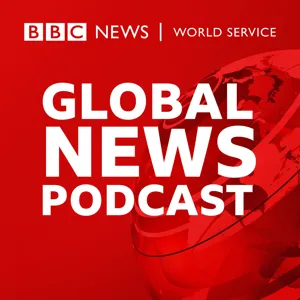Podcast Summary
Heating up Republican primary and international crises: Donald Trump leads GOP primary, while conflicts in Yemen, Sudan, Gaza, and protests in Germany and the UK overshadow these issues, but their impacts are significant and require attention
The Republican primary race is heating up with Donald Trump looking poised for a definitive victory, while international issues such as the situation in Gaza and growing policy disagreements between the US and Israel continue to unfold. The US is dealing with ongoing conflicts in Yemen and Sudan, and there are significant protests in Germany and the UK regarding immigration. Former officials like Ricardo Zuniga provide valuable insights into current crises, such as the violence and cartel activity in Ecuador. While the Republican primary candidates are focusing on immigration and cartels, their proposed solutions, such as indiscriminate shooting, are controversial. The interview with Ricardo Zuniga highlights the importance of addressing these issues, which can have significant impacts on governments and people's lives. In a normal world, these issues would be major news stories, but in today's context, they often get overshadowed by other events. It's crucial to keep an eye on these issues and understand their implications.
Military efforts against Hamas ineffective, Diplomacy key to resolution: Military actions against Hamas have limited impact, negotiations crucial for hostage release and conflict resolution
The ongoing conflict between Israel and Hamas in Gaza shows no signs of an easy resolution through military means. Reports suggest that Israeli military efforts have only resulted in the deaths of 20-30% of Hamas' fighters and that their tunnel infrastructure is much larger than anticipated. The release of hostages and a ceasefire are being discussed through negotiations, but it's unclear if Hamas will accept the proposed terms. The families of the hostages are putting pressure on the Israeli government to prioritize negotiations. It's clear that a military solution is not feasible, and diplomacy will play a crucial role in resolving the conflict and freeing the hostages. The situation remains tense, and the outcome is uncertain.
Military solutions in Gaza: Sustainability and effectiveness questioned: The use of military force without a clear end goal or plan for peace in Gaza risks long-term instability, human suffering, and regional consequences.
The ongoing military operation in Gaza raises serious questions about the sustainability and effectiveness of military solutions in addressing complex geopolitical issues. The destruction of infrastructure and displacement of millions of people without a clear plan for the future is a recipe for long-term instability and human suffering. The lack of a clear military strategy to defeat Hamas and the seeming objective of simply leveling Gaza is concerning and could lead to further escalation in the region. The use of military force without a clear end goal or plan for peace is not worth the enormous human cost and potential regional consequences. The international community must work towards diplomatic solutions that address the root causes of conflict and prioritize the protection of civilians and infrastructure.
Israel-Hamas Conflict: Clear Objectives and Lasting Peace: The Israel-Hamas conflict raises doubts about clear objectives and the possibility of lasting peace due to Hamas' resistance, Netanyahu's rejection of a two-state solution, and differing views between Israel and the US on post-conflict situations.
The ongoing conflict between Israel and Hamas in Gaza raises questions about clear objectives and the possibility of a lasting peace. Hamas, as a resistance movement against the occupation, cannot be militarily defeated. Netanyahu's rejection of a two-state solution and control over the entire territory west of the Jordan River creates tension with the US and other Arab countries. The US and Israel have differing views on the post-conflict situation, with Israel wanting normalization agreements and financial aid from Arab countries contingent on the creation of a Palestinian state. Netanyahu's opposition to a two-state solution and his comments have strained relations with the US. The lack of clear objectives and ongoing tension threaten American credibility in international peace efforts.
Israeli PM's rejection of two-state solution harms peace and US credibility: Israeli PM's opposition to a Palestinian state undermines peace, damages US credibility, and threatens Israel's long-term security.
The Israeli Prime Minister's public rejection of a two-state solution for Palestinians not only undermines the prospects for peace but also damages American credibility. Netanyahu's consistent opposition to a Palestinian state, as evidenced by his past statements and actions, has been overlooked for years. His latest rejection comes at a time when the US is trying to negotiate normalization agreements with Arab countries and secure support for the Palestinians. Netanyahu's stance not only goes against the desires of the international community but also threatens Israel's long-term security and stability. The US's continued support for Netanyahu despite his opposition to a two-state solution makes the US appear inconsistent and unreliable in its diplomatic efforts.
Netanyahu's opposition to a Palestinian state: Netanyahu refuses to allow a Palestinian state, and US-led airstrikes against Houthi rebels in Yemen lack an end date, signaling ongoing conflicts in Middle Eastern politics
Netanyahu's stance against a Palestinian state and his incitement towards opposition to peace agreements have been consistent throughout his political career. He has publicly stated that he will not allow a Palestinian state as long as he is prime minister. Furthermore, the US and the UK have been conducting airstrikes against Houthi rebels in Yemen, but President Biden acknowledged that they are not working to deter the Houthis and there is no end date in sight for the military campaign. Despite denying that they are at war with Yemen or the Houthis, the US is planning for a sustained military campaign against them. These complex situations in Israel and Yemen highlight the ongoing challenges in Middle Eastern politics and the complexities of US involvement in these conflicts.
Military conflicts in Middle East pose challenges for policymakers and spokespersons: Clear communication and a well-defined strategy are essential to address public concerns and ensure accountability during military conflicts in the Middle East, especially when the legal basis and objectives are unclear.
The ongoing military conflicts in various regions, such as Iraq, Syria, and Gaza, pose complex challenges for policymakers and spokespersons. The legal basis for military interventions and the lack of clear objectives can lead to public scrutiny and criticism. The U.S. Houthi escalation, in particular, raises questions about the legal framework and the long-term strategy. The War Powers Act requires congressional approval for military campaigns, and it's crucial for the administration to provide clear communication on the goals and duration of military actions. The current situation in the Middle East feels reactive, and there's no clear vision for managing the multifaceted conflicts. Effective communication and a well-defined strategy are essential to address public concerns and ensure accountability.
US involvement in Yemen raises concerns about Biden's Middle East strategy: The US's military actions in Yemen, despite Biden's plans to focus on Asia and avoid conflicts, could perpetuate violence and instability, and the humanitarian impact on the Yemeni people is a major concern.
The current military actions against the Houthis in Yemen, instigated by the Houthis themselves, raise questions about the strategic vision and goals of the Biden administration in the Middle East. The region is seeing an escalation of conflicts, and the humanitarian impact on the Yemeni people, who have already suffered immensely, is a major concern. The US's involvement, despite Biden's stated intentions to pivot to Asia and avoid military conflicts, could perpetuate the cycle of violence and instability. Additionally, Iran's recent missile attacks on targets in Syria, Iraq, and Pakistan further complicate the situation, potentially leading to a dangerous escalation. It is crucial for the US to consider the strategic and humanitarian implications of its actions and reconsider its role in the ongoing conflicts in the Middle East.
External actors fueling Sudan conflict with weapons: The UAE's support of the Rapid Support Forces in Sudan with weapons is escalating the conflict, causing thousands of deaths and millions of displaced people, despite international condemnation.
The ongoing conflict in Sudan, which has resulted in thousands of deaths and millions of displaced people, is being fueled by external actors, including the United Arab Emirates, providing weapons to the paramilitary group, the Rapid Support Forces (RSF). This support has given the RSF a significant advantage in the war against the Sudanese Armed Forces. The international community, including the US, has accused the RSF of war crimes and called for an end to the weapons shipments. However, the UAE continues to provide support, raising questions about the motivations of these countries and the devastating consequences of their actions on the people of Sudan. This situation is not isolated, as the UAE's relationship with the RSF dates back to their involvement in the conflict in Yemen in 2016. It's crucial for the international community to address this issue and find a way to bring an end to the conflict and ensure the people of Sudan are represented and their suffering is acknowledged.
UAE's Arms Shipments to RSF in Sudan: Diplomatic Pressure Alone May Not Be Enough: Despite diplomatic concerns, UAE's arms shipments to RSF in Sudan continue due to their unharmed interests. Root cause is abandonment of democratic transitions, leading to ongoing violence and autocracy. European protests against far-right AFD party's anti-immigrant stance impact regional elections.
Diplomatic pressure alone may not be enough to stop the UAE's arms shipments to the RSF in Sudan, as the UAE's interests may not be negatively impacted by their continued support. The US and other Western countries have raised their concerns diplomatically, but the UAE may not listen if they don't feel their actions will harm them. The root cause of this issue is the abandonment of democratic transitions in favor of military power struggles. Until the international community finds a way to break this cycle of violence and autocracy, these scenarios will continue to unfold, affecting populations in countries like Sudan, Yemen, and Gaza. Meanwhile, in Europe, the far-right Alternative for Germany (AFD) party's popularity has been surging, leading to massive protests against them over the weekend. An estimated 100,000 to over 1,400,000 people took to the streets in Berlin, Munich, and Hamburg to demonstrate against the AFD and their plans to deport millions of immigrants and refugees, including those with German citizenship. These protests mark a significant shift in German opposition to the AFD and could impact upcoming regional elections in eastern Germany where the party is doing well.
Protests against immigration in Europe and UK demonstrate people's attention and values: Protests reveal concerns about immigration policies, highlighting the importance of addressing them with a values-driven approach and effective communication.
While protests against immigration in Europe and the UK may not directly reverse political trends, they do demonstrate that people are paying attention to the issue and expressing their values. For instance, the massive protest in Germany showed awareness of the high-stakes political climate and a call for balanced immigration policies. Meanwhile, in the UK, the controversial Rwanda immigration plan faced legal challenges and opposition from within the ruling party, despite significant financial investment. These events underscore the importance of addressing immigration concerns with a values-driven approach and effective communication. The UK's Rwanda plan, for example, faced backlash due to concerns about safety and human rights, highlighting the need for a more nuanced and humane immigration policy.
UK's Hypocritical Immigration Stance: The UK's anti-immigration stance contradicts their reliance on immigrant labor, particularly in healthcare and education, due to economic needs and austerity measures.
The UK government's stance on immigration is hypocritical and driven by economic needs. Despite their public posturing against immigration, the UK relies heavily on immigrant workers, particularly in the healthcare and education sectors. This need for labor sources has increased due to the UK's austerity and Brexit programs. Meanwhile, Elon Musk's apology tour for his past anti-Semitic remarks continues, raising questions about his sincerity and genuine understanding of the issue. His recent visit to Poland and Auschwitz with Ben Shapiro, following his controversial tweets and interactions with known anti-Semites, has done little to quell concerns. It's important to remember that actions often speak louder than words, and true change requires more than just public displays or symbolic gestures.
Elon Musk and Ben Shapiro's Unexpected Connection: Elon Musk and Ben Shapiro, despite their public disagreements, share mutual interests, demonstrating that complex relationships exist beyond political stances.
The relationship between Elon Musk and Ben Shapiro, despite their public disagreements, is driven by mutual interests. Meanwhile, in other news, Ron DeSantis' recent presidential campaign announcement video contained a fake Churchill quote. Moving on to more serious matters, the situation in Ecuador has reached a critical point with enormous gang and drug violence, leading to a state of emergency declaration by President Mbaha. The root causes of this chaos include structural issues, and it's essential to understand what's happening in Ecuador as it could serve as a warning sign for other parts of Latin America experiencing similar vulnerabilities. Ricardo Zuniga, a former lead staff member at the White House and State Department on Latin American issues, provides valuable insights into the causes and potential solutions for the current crisis in Ecuador.
Ecuador's Violence Rooted in Geography, Regional Politics, Criminal Geopolitics, and Governance Breakdown: Ecuador's strategic location, regional instability, criminal partnerships, and governance issues contribute to its high levels of violence and drug trafficking.
The intense level of violence in Ecuador can be attributed to a combination of factors including geography, regional politics, criminal geopolitics, and the breakdown of governance. Geographically, Ecuador's location between Colombia and Peru, two of the world's largest cocaine producers, and its excellent port in Guayaquil make it an ideal launch point for mass shipments of cocaine. Regionally, the peace process in Colombia led to a vacuum in drug control along the border, allowing new gangs access to the cocaine market. Criminally, Mexican cartels are at their most powerful with unprecedented access to finance, weapons, and global networks, and they found local partners in Ecuadorian gangs. Lastly, the breakdown of governance in Ecuador, exacerbated by the influx of drug money, has led to widespread corruption. The violence is the point for these groups to demonstrate their power and control over the state and population.
Ecuador's Drug Challenge: International Cooperation is Key: International cooperation is vital for Ecuador to effectively combat drug production and trafficking. This includes support from the US for security, Europe for demand reduction and border security, neighboring countries for regional cooperation, and multilateral development banks for resources and organization.
Ecuador is facing a significant challenge in dealing with drug production and trafficking within its borders, which is part of a larger, globally connected issue. The country's resources are insufficient to combat this problem effectively on its own. International cooperation is crucial, involving the US for security support, Europe for addressing demand and border security, and neighboring countries for regional cooperation. It's essential to view these organizations as criminal corporations and attack them from various jurisdictions. Multilateral development banks can also help Ecuador during this critical moment. This is not just about providing equipment, but rather about international organization and collaboration.
Focusing on cartels' financial resources: Governments should prioritize cutting off cartels' financial resources and targeting their economic activities to effectively combat them.
The cartels in Latin America are not just about drugs or moving people, but they are primarily about making money. To effectively combat them, governments need to focus on imposing costs and going after their financial resources. The Mexican government, in particular, should prioritize cutting off the flow of weapons from the United States and targeting the cartels' economic activities. Additionally, there are concerning signs of instability in Latin America, including the rise of non-ideological dictators and increasing violence, which is contributing to the flow of people to the US border. These issues require urgent attention and a new approach to address the root causes.
Political trends in Latin America mirror the West's dissatisfaction: Latin America's political landscape reflects growing discontent, similar to the West, with leaders failing to deliver public goods. Despite challenges, the region has made progress in improving quality of life and access to services, making it a vital food provider for the world.
Latin America is deeply interconnected with the West and currently experiencing similar political trends, marked by high levels of dissatisfaction with existing political classes and their inability to deliver public goods. This phenomenon is not new in Latin America, where populist leaders like Bukele represent a repackaging of an old tradition. Despite challenges such as violence, poverty, and slow COVID recovery, the region has made significant strides in improving quality of life and access to basic services over the past few decades. Countries investing in lower middle income populations are seeing positive returns. Long-term, Latin America's role as a major food provider to the world is crucial for global food security. While there are no perfect models that would directly apply to the US, understanding and addressing the root causes of dissatisfaction in Latin America could offer valuable insights for governance and policy-making.
Complex challenges in Latin America: Structural issues and organized crime require a new approach from governments. Solutions will take years to implement and require international cooperation.
While there is optimism for improvement in Latin America, particularly in Ecuador, the challenges facing the region are deep-rooted and complex. Structural issues and the sophistication of organized crime require a new approach from governments. These problems will not be solved quickly and will take years to address. It's important to recognize the international nature of these issues and the need for a coordinated response. Additionally, the conversation touched on the entertainment industry and the intersection of business and celebrity culture. The speakers shared their personal experiences and perspectives, adding a humanizing element to the discussion. Overall, the conversation highlighted the complexity of issues in Latin America and the need for a nuanced and long-term approach to addressing them.






